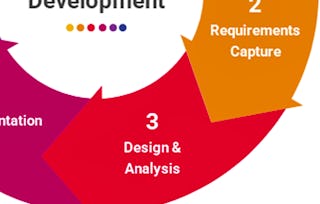Software Development Life Cycle (SDLC) is the process of developing software through planning, requirement analysis, design, implementation, testing, and maintenance. This course focuses on the implementation and testing phases of SDLC, and you will examine different software development processes for large software systems development, and understand the strengths (pros) and weaknesses (cons) of different software development processes. You will also encounter defensive programming techniques to prevent software bugs during implementation, and learn how to test your system thoroughly using different types of test cases.

Software Engineering: Implementation and Testing

Software Engineering: Implementation and Testing
This course is part of Software Engineering Specialization

Instructor: Kenneth Wai-Ting Leung
18,876 already enrolled
Included with
133 reviews
Recommended experience
Skills you'll gain
- Software Development
- Software Engineering
- Acceptance Testing
- Integration Testing
- White-Box Testing
- Test Case
- Unified Modeling Language
- Software Development Life Cycle
- Unit Testing
- User Acceptance Testing (UAT)
- Agile Methodology
- Software Testing
- Project Management
- Configuration Management
- Waterfall Methodology
- Software Development Methodologies
- System Testing
- Secure Coding
- Debugging
- Requirements Analysis
- Skills section collapsed. Showing 9 of 20 skills.
Details to know

Add to your LinkedIn profile
7 assignments
See how employees at top companies are mastering in-demand skills

Build your subject-matter expertise
- Learn new concepts from industry experts
- Gain a foundational understanding of a subject or tool
- Develop job-relevant skills with hands-on projects
- Earn a shareable career certificate

There are 7 modules in this course
Welcome to the first module of this course! In this module, you will learn: (1) The tasks involved in software development. (2) The processes involved in Software Development Life Cycle (SDLC).
What's included
3 videos1 reading1 assignment
In this module, you will learn: (1) Different software development processes, including Waterfall, Code-and-Fix, Prototyping, Spiral, Phased-Released, Agile, Extreme Programming, Continuous Integration, Scrum, and Unified Process.
What's included
3 videos3 readings1 assignment
In this module, you will learn: (1) The purpose and the major activities of implementation. (2) Defensive programming techniques to prevent software bugs during implementation.
What's included
3 videos3 readings1 assignment
In this module, you will learn: (1) Different techniques for debugging. (2) Configuration management to manage, control and monitor changes to life cycle artifacts.
What's included
2 videos1 reading1 assignment
In this module, you will learn: (1) The purpose of testing. (2) Design tests that have the highest likelihood of finding defects with the minimum amount of time and effort. (3) What is White Box testing. (4) Revealing subdomains for Basis Path Testing.
What's included
3 videos3 readings1 assignment
In this module, you will learn: (1) Revealing subdomains for Condition Testing, Loop Testing, and Data Flow Testing. (2) What is Black Box testing. (3) Revealing subdomains with equivalence partitioning. (4) Revealing subdomains for Boundary Testing.
What's included
3 videos3 readings1 assignment
In this module, you will learn: (1) How to perform tests. (2) How to evaluate tests. (3) Deriving test case for Acceptance Testing.
What's included
3 videos3 readings1 assignment
Earn a career certificate
Add this credential to your LinkedIn profile, resume, or CV. Share it on social media and in your performance review.
Instructor

Explore more from Software Development
 Status: Free Trial
Status: Free TrialThe Hong Kong University of Science and Technology
 Status: Free Trial
Status: Free TrialUniversity of Minnesota
 Status: Free Trial
Status: Free TrialAmazon
 Status: Free Trial
Status: Free TrialUniversity of Minnesota
Why people choose Coursera for their career

Felipe M.

Jennifer J.

Larry W.

Chaitanya A.
Learner reviews
- 5 stars
72.93%
- 4 stars
21.05%
- 3 stars
3.75%
- 2 stars
0.75%
- 1 star
1.50%
Showing 3 of 133
Reviewed on Apr 16, 2025
Great and Exceptional, But I expect more in details.
Reviewed on Jan 13, 2025
Helps me to understand the overall SDLC PROCESS, GREAT COURSE
Reviewed on Nov 24, 2022
Excellent course.Feedback: Cut presenter mistakes from videos.

Open new doors with Coursera Plus
Unlimited access to 10,000+ world-class courses, hands-on projects, and job-ready certificate programs - all included in your subscription
Advance your career with an online degree
Earn a degree from world-class universities - 100% online
Join over 3,400 global companies that choose Coursera for Business
Upskill your employees to excel in the digital economy
Frequently asked questions
To access the course materials, assignments and to earn a Certificate, you will need to purchase the Certificate experience when you enroll in a course. You can try a Free Trial instead, or apply for Financial Aid. The course may offer 'Full Course, No Certificate' instead. This option lets you see all course materials, submit required assessments, and get a final grade. This also means that you will not be able to purchase a Certificate experience.
When you enroll in the course, you get access to all of the courses in the Specialization, and you earn a certificate when you complete the work. Your electronic Certificate will be added to your Accomplishments page - from there, you can print your Certificate or add it to your LinkedIn profile.
Yes. In select learning programs, you can apply for financial aid or a scholarship if you can’t afford the enrollment fee. If fin aid or scholarship is available for your learning program selection, you’ll find a link to apply on the description page.
More questions
Financial aid available,

